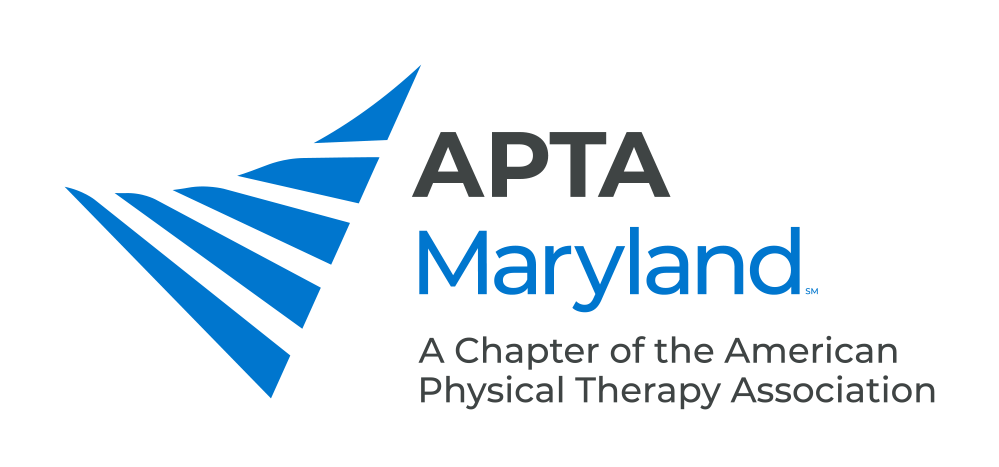Spring Meeting
March 9, 2024 | A Virtual Event
Schedule
- 8:30-11:30 am Courses
- 12:00-1:00 Member Meeting
Educational Credit: The spring meeting courses are approved for three (0.3) credit hours by the Maryland Board of Physical Therapy Examiners
* The Economic Value of PT course is worth two credit hours from 8:30-10:30 am. We have added virtual platform presentations to allow you to receive 3 CEUs.
Looking for the link to join the course?
After registering you should have received an email confirmation that includes the zoom links for the courses.
Please check spam if unable to locate.
This annual educational gift from the APTA of Maryland is to celebrate and spotlight the many local Clinical Specialists in various setting and practice areas as well as to give back to the valued members of our chapter as a THANK YOU for your Membership and support! APTAMD Members Receive up to three (3) FREE Contact Hours! ($50 for non-members)
Course Option 1: Learn about the landmark, evidence-based report by the American Physical Therapy Association, “The Economic Value of Physical Therapy in the United States.” Hear from one of the report authors, Jason Falvey, PT DPT, PhD about the economic model used to calculate the net benefits to patients and the U.S. health care system of choosing physical therapy over alternative treatments for eight conditions.
Dr. Falvey will breakdown the 8 conditions, and discuss how to use the data to impact payment and policy.
Course Option 2: What’s New in Amputee Rehabilitation
This course delves into the surgical considerations of amputation and their implications for physical therapy outcomes. It thoroughly examines above and below knee prosthetic alignment, highlights frequently observed gait deviations resulting from misalignment, and provides insight into assessing proper prosthetic fit. Participants will explore the Functional Lower-Limb Amputee Gait Assessment (FLAG Assessment), a novel observational gait analysis tool developed by the University of Miami. The FLAG Assessment aims to enhance communication and collaboration between physical therapists and prosthetists involved in observational gait analysis for individuals with unilateral lower limb amputation (LLA). The course also covers physical therapy interventions tailored to address the six major gait actions identified in the FLAG Assessment.
Course Objectives:
- Review surgical considerations of amputation and their impact on physical therapy outcomes.
- Analyze above and below knee prosthetic alignment and recognize common gait deviations associated with misalignment.
- Evaluate methods for assessing proper prosthetic fit.
- Explore the Functional Lower-Limb Amputee Gait Assessment (FLAG Assessment) as a tool for observational gait analysis.
- Discuss physical therapy interventions targeting the six major gait actions outlined in the FLAG Assessment.
- Enable providers to independently perform observational gait analysis using the FLAG Assessment.
- Enhance communication and collaboration between physical therapists and prosthetists by facilitating the exchange of common language regarding various gait deviations
Dr. Falvey is a board-certified geriatric physical therapist and clinician-scientist dedicated to improving aging in place for older adults living with new disability. Dr. Falvey received both a dual bachelors degree in English Literature and Kinesiology and his DPT degree from Husson University in his home state of Maine, a PhD in Rehabilitation Sciences from the University of Colorado, Anschutz Medical Campus, and he subsequently completed a post-doctoral fellowship in Epidemiology of Aging at the Yale School of Medicine. Dr. Falvey is also the director of The ENhancing Rehabilitation to Improve Community Health (ENRICH) lab, which aims to reduce participation and mobility inequities among older adults.
Dr. Falvey’s published scholarship and grant funding has focused on improving functional outcomes and quality of life for older adults recovering from disabling hospitalizations, such as those for orthopedic surgery, critical illness, or hip fracture. The overall focus of Dr. Falvey’s work is to reduce disparities in healthy aging in place among older adults. This work is currently supported by federal, foundation, and institutional funds. Dr. Falvey is the second physical therapist ever to be awarded a $1.1 million Paul B. Beeson Emerging Leaders in Aging Career Development Award (K76) from the National Institute on Aging, which supports a large scale initiative focused on understanding and address neighborhood-level barriers to community mobility among older adults recovering from fall-related traumatic injuries like hip fracture. He uses quantitative epidemiological and health services research methods, qualitative methods, and community-participatory approaches to address research questions important to the Baltimore community and more broadly older adults and their caregivers.
Dr. Falvey is also the co-principal investigator with Dr. Jasmine Travers (NYU) on a 2 year, $150,000 grant from the The Patrick and Catherine Weldon Donaghue Medical Research Foundation to evaluate neighborhood socioeconomic disadvantage and the resultant impact on nursing home staffing and resident outcomes. Dr. Falvey is also a co-investigator on two additional studies funded by the NIH NHLBI and PCORI evaluating post-acute care use, care transitions, and patient-centered outcomes for older survivors of heart attacks and hip fractures.
Dr. Falvey is an active member of the APTA, and serves on multiple committees evaluating how to demonstrate value of post-acute rehabilitation care on patient outcomes following acute hospitalization. He is 1 of 13 appointed members of the APTA Public Policy and Advocacy Committee, and is a standing member of the Post-Acute Care Workgroup. He is also co-lead of the National Value in PT Workgroup of the APTA. Dr. Falvey also has a an appointed position on the Examination Development Committee for the Federation of State Boards of Physical Therapy.
Locally, Dr. Falvey is a member of the Transporation CORE of the Baltimore Metropolitan Council, providing input on public transportation infrastructure and accessibility specific to the needs of older adults.
Michelle Jamin, PT, DPT is the owner of Align Rehabilitation, a private practice dedicated exclusively to the limb loss population. Michelle’s passion is the improve the lives of those living with limb loss. Through experience in both outpatient and inpatient physical therapy settings, she recognized a gap in access to expert amputee rehabilitation within the community. Motivated by a desire to make a difference and ensure that no amputee ever feels isolated on their journey with limb loss, she opened Align Rehabilitation. She has 2 main locations, Abingdon, Maryland and Newark, Delaware. She was voted “Newark’s Best Physical Therapist” in 2023 and is currently expanding her Maryland location, designing it to be a state-of-the-art training facility for those with limb loss.
Michelle specialized in amputation rehabilitation early on in her career, following her childhood dream of servicing this population. Her lifelong commitment traces back to elementary school, following the events of September 11, 2001. News coverage of our injured service members rehabilitating at Walter Reed National Military Medical Center captivated Michelle’s attention and shaped the entirety of her future.
Michelle serves as adjunct faculty at the University of Maryland, College Park, teaching an upper level course KNES306: Prosthetics for Limb Amputations and assists with the University of Delaware’s Doctor of Physical Therapy Program during their prosthetics didactic work. She served on the Board of Directors and as the Vice President of Orthotics Prosthetics Activities Foundation (OPAF), a non-profit whose mission is to provide adaptive recreation to those across the country facing mobility challenges. She was a recipient of the University of Maryland’s Terrapins Club 30 Under 30 Class of 2023, being recognized for having a major impact in her community and career.
While earning of Doctor of Physical Therapy from Elon University, she completed a 6-week independent study at Walter Reed National Military Medical Center in the biomechanics research lab, collecting data for the Osseoanchored Prostheses for the Rehabilitation of Amputees (OPRA) Implant System prior to it’s FDA approval for use 2020. She authored a rehabilitation protocol for stage 1 and 2 of the surgery to be administer to physical therapist outside of the Department of Defense (DoD).
Michelle is active within the APTA, having served as the Communications Chair for Federal APTA, Director of Government Relations for APTA Maryland, and on the Board of Directors for the Academy of Clinical Electrophysiology & Wound Management. She was recognized as one of the 2022 APTA Emerging Leaders by the APTA Federal. Her research study titled “Attitudes, perceptions, and expectations of a student special interest group in student members of a professional organization in the United States” was published in the first edition of the Journal of Clinical Electrophysiology and Wound Management in 2023.
Michelle’s mission is to share her clinical expertise with her community, offering the specialized care and support needed for individuals seeking to regain their independence and mobility after limb amputation. She seeks to educate other healthcare providers on prosthetic rehabilitation, enabling them to bring this knowledge back to their communities and expand access to skilled prosthetic care to those who need it most. She is excited for the completion of her clinic’s expansion so she can begin serving as a clinical instructor for students interested in amputation and prosthetic rehabilitation.


